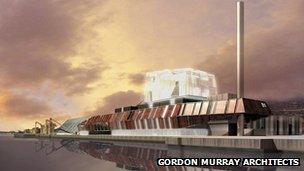Dundee biomass plant 'would have negligible impact' on air quality
- Published

The Dundee Biomass plant would generate 100MW of electricity, equivalent to 86% of the city's needs
Plans for a biomass plant in Dundee have taken a step forward after a study suggested its impact on local air pollution would be negligible.
Forth Energy said the plant could generate 100MW of electricity.
Concerns had been raised about the levels of nitrogen dioxide the facility would release into the atmosphere.
Air quality monitoring and computer modelling have now suggested the increase in NO2 levels would be less than 1%.
The study was launched in 2011 after questions were raised about the environmental impact of the plant.
Dundee City Council had said it would defer its position on the plant until the air quality analysis had been completed.
NO2 impact
Forth Energy monitored the air quality at 25 locations in Dundee over a 12 month period between October 2011 and September 2012.
Dundee City Council asked that particular attention be given to the potential impact of emissions of NO2 from the Renewable Energy Plant and associated operational road traffic movements.
This is because concentrations of NO2 in the air at certain locations in Dundee currently exceed the annual average defined limit due to emissions from road traffic.
The limit, set by the European Union, is 40 micrograms of NO2 per cubic metre of air.
The Forth Energy study said: "Following extensive monitoring at 25 locations across Dundee, the findings reveal that the annual average levels at most of the residential properties close to all the monitoring locations were within the air quality objective."
It added: "The impact of emissions from the Renewable Energy Plant and associated operational traffic movements would be very small.
"The results show that, at its highest potential level, just 0.98 micrograms per cubic metre would be added to airborne concentrations of NO2.
"On this basis, there is no air quality impact that should prevent consent from being granted."
Calum Wilson, managing director of Forth Energy, said: "The results of the monitoring show that the impact from the plant and associated traffic on Dundee's air quality would be negligible. We are satisfied that there is no reason, on air quality grounds, to prevent consent for the plant being granted.
"The plant would support the establishment of a renewables manufacturing hub at the port. It would support the city's ambitious development plans.
"And it would help put Dundee on the map as a low carbon city."
Numerous objections
Forth Energy's application is currently out for consultation and will be submitted to the Scottish government once that has been completed.
When first proposed the plans attracted numerous objections from Dundee residents.
Councillor Richard McCready said he believed there needed to be greater discussion before any decision on the plant was taken.
He said: "There needs to be scrutiny of the proposals in terms of their impact on the environment, both in Dundee and in the areas where the fuel will come from and the impact of the transport of the fuel."
"We also need to examine in detail the jobs claims made about these proposals. I am clear that the council has a duty to promote jobs but we also have a duty to protect the environment and we need to ensure that the balance between the two is correct."
Forth Energy said if built, the plant would generate 100MW of electricity, the equivalent of 86% of Dundee's power needs, and produce 30MW of heat, enough to supply the needs of six hospitals the size of Ninewells.
It also said it expected the plant to create 70 long-term jobs and save the country nearly three million tonnes of carbon over its 20 year life, compared to a traditional coal fired power station.
- Published9 February 2012